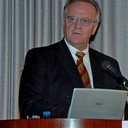A case of limited cutaneous systemic sclerosis developing anti-mitochondria antibody positive primary biliary cirrhosis after acute myocardial infarction.
Keywords
Abstract
In this report, we present a 63-year-old woman who had limited cutaneous systemic sclerosis and subsequently developed typical primary biliary cirrhosis after an acute myocardial infarction. The patient initially developed Raynaud's phenomenon, and 4 years later visited the clinic in 1994 complaining of abdominal distress, xerostomia, and xerophthalmia. A diagnosis of limited cutaneous systemic sclerosis was based on Raynaud's phenomenon, sclerodactyly and anti-centromere antibodies. She was also found to have anti-inositol 1,4,5-trisphosphate receptor 3 (IP(3)R3) antibodies, but anti-mitochondrial antibodies were only weakly positive. Seven years later, she developed vertigo and nausea, and was hospitalized due to complaints of an oppressive sensation of the anterior chest. Electrocardiogram results showed a reduction of R waves and ST segment elevation in II, III, and aVf leads. Coronary angiography showed 99% obstruction of the left anterior descending artery and 50% of stenosis of the right coronary artery. Three years later, the patient was noted to have anti-mitochondrial antibodies. Retrospective analysis of the patient's sera showed that IP(3)R3 antibodies were decreasing. Since myocardium is particularly rich in mitochondria, it is thought that myocardial infarction may have been the triggering event that initiated antigen-presenting cells to selectively induce an anti-mitochondrial antibody response.



